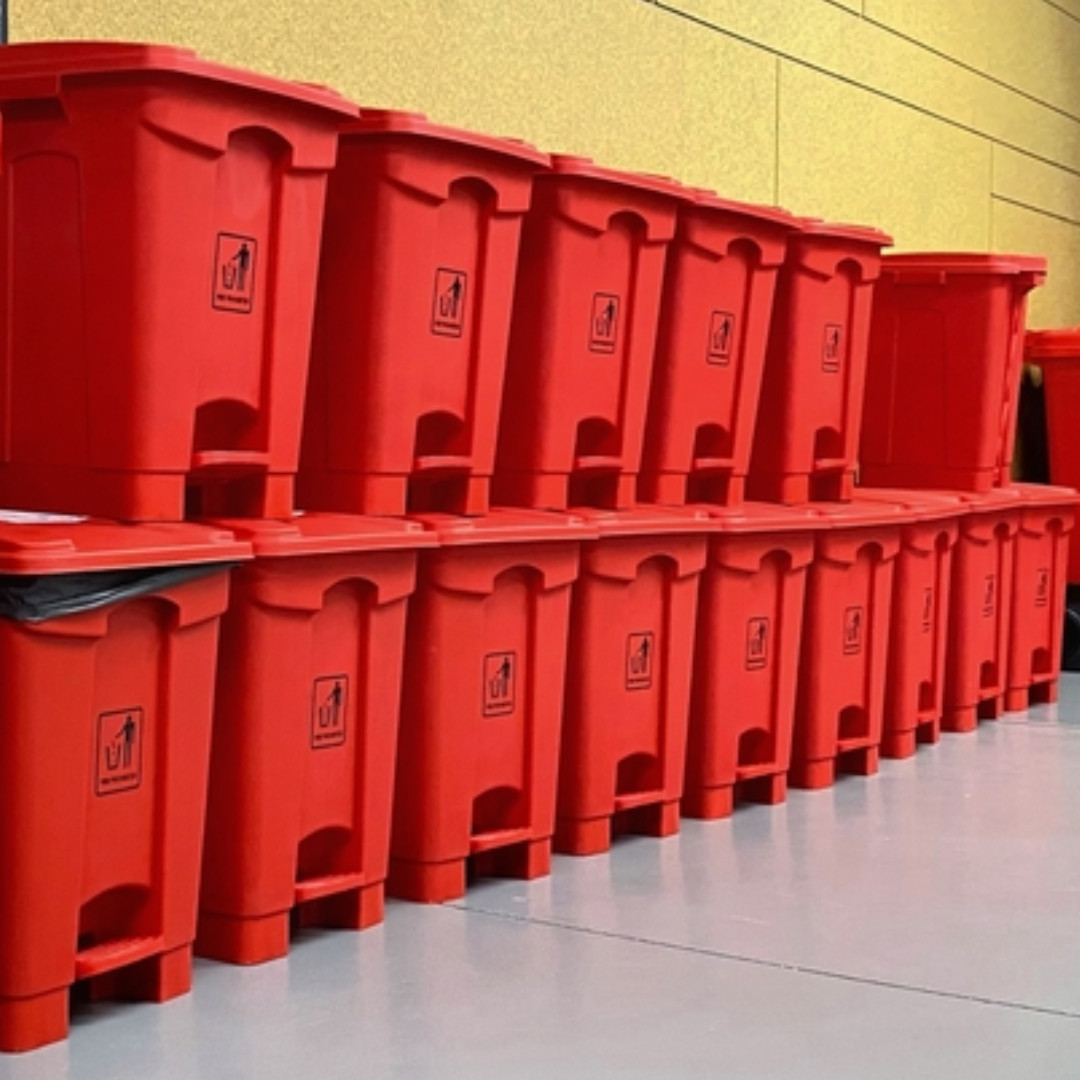The first case of the COVID-19 virus in the U.S. was diagnosed on Jan. 20. By March 26, the United States became the epicenter of the pandemic as domestic cases surpassed those in China and Italy for the first time. In the process, the steady uptick of domestic infections set in motion the nationwide closure of countless businesses and schools, cancelation of travel, and shelter in place orders.
As life has abruptly been put on hold for many Americans, waste and environmental services professionals have been called on to help deal with shifting solid waste collection demands, suddenly unpredictable volumes and the emergency need for decontamination services.
Managing medical and pharmaceutical waste
Selin Hoboy, vice president of government affairs and compliance at Bannockburn, Illinois-based Stericycle, says that the virus has altered the makeup of its incoming medical waste stream. Although the company is seeing some higher volumes from hospitals combating the disease, the delay in elective procedures and enforcement of stay-and-home ordinances has helped balance out the overall demand.“We’re seeing some increase in medical waste produced due to heightened use of personal protective equipment (PPE) in diagnosing and treating COVID-19 patients, and some non-traditional waste is also sometimes being managed as regulated medical waste,” Hoboy says. “However, increases in waste from COVID-19 may be offset by continued declines of elective surgeries or temporary closures of smaller healthcare practices. The impact of the pandemic is changing day to day and hour to hour, and we are closely monitoring the situation with federal, state and local agencies to determine next steps.”
Hoboy says that medical waste from COVID-19 patients and workers is managed as Category B waste. This means that once it is discarded, it is to be treated as normal regulated medical waste that is subject to the same treatment and disposal guidelines as most other potentially infectious medical waste.
Although the waste is treated the same and rendered innocuous through standard medical waste treatment methods, Hoboy says that the company has changed its protocols for hospital waste collections to minimize the risk of workers coming into contact with patients who are potentially infected.
“We have updated protocols and procedures for in-hospital services. For example, Stericycle service technicians will not be entering any patient isolation rooms regardless of isolation room signage, and technicians will be checking in at nurses’ stations to ask about any rooms they should not be entering,” Hoboy says. “Additionally, our team members are authorized to deny pickup of non-conforming waste from our customers who are not following our waste acceptance protocols or packaging guidelines.”
Hoboy says because of the rapidly changing nature of the virus, forecasting labor requirements is challenging, but that the company is able to add additional shifts for its workers and expand capacity if necessary.
Bob Cappadona, president and COO of Boston-based Veolia North America, says that the demand for the company’s services relative to COVID-19 has varied depending on the client.
“The core of our work [relating to COVID-19] has been at organizations that are involved in research,” he says. “A very significant group of customers for us is the pharmaceutical and biotechnology sector … and in some cases, we’re working at some of the key companies that are doing COVID-19 research. [And these customers] are looking for additional manpower support from us. They’re extremely busy with the research work that they’re doing in pursuit of therapies and cures. So, as we’ve reached out to our customers, they’ve wanted assurances that we’re going to be there for them, and we’ve signed a lot of emergency response-type agreements and support agreements for these companies.”
Conversely, due to the number of businesses being suddenly shut down across the country, Cappadona says some of Veolia’s smaller medical service clients have seen volumes decline.
“If you’re looking at the total spectrum of those who generate waste and ship it to us, half of them are very busy and half of them are closed. Many of the medical waste customers that ship into our facilities will be a family physician, a dentist or various types of clinics. And many of these facilities have closed or slowed considerably, so our level of activity with this group may be down. And then in some of the larger facilities, we may see slight volume increases, but at this point we haven’t seen anything dramatic,” Cappadona says.
Decontamination nation
As evidenced by the increased demand for cleaning products and the shortage of available hand sanitizers at retailers from coast to coast, sanitation and decontamination are top of mind for many Americans. This is especially true for locations and businesses that have, or suspect to have, come into contact with those carrying the virus.Currently, Cappadona says Veolia is providing industrial decontamination services mostly for its core clients, but is able to heed the call to serve a larger demographic through its nationwide emergency response group should the need arise.
US Ecology CEO Jeff Feeler says that his company has seen a 500 percent increase in demand for its decontamination services over the latter half of March due to COVID-19 concerns.
“We are currently providing decontamination services for a wide variety of public and private sector customers across the U.S., including retailers and pharmacies, cruise lines, airlines, schools, large industry, building services companies, government agencies and utilities,” Feeler says. “This service includes decontamination of sites that have had direct or potential exposure to the virus, or proactive preventative cleaning of high-traffic areas or frequently touched surfaces.”
Feeler says the Boise, Idaho-based company’s decontamination and preventative cleaning services include: wipe downs of horizontal surfaces and high-traffic/touchpoint areas; the use of portable fogger machines filled with decontamination solution for smaller areas; the use of a portable hydrogen peroxide disinfectant system for larger areas; and proper consolidation, transportation and disposal of all waste including used PPE.
While Feeler says the company’s estimated response times vary depending on several factors including volume of incoming calls, the company’s average response from receipt of initial calls to personnel arriving on-site has historically averaged from two to three hours. Even as demand increases along with the number of COVID-19 cases, Feeler says his team is prepared to meet the demand for its services.
“As the virus continues to spread and more businesses are facing the realities of long-term operational restrictions from local, state and federal regulators, they realize they must have a plan in place to safely resume day-to-day operations. … Our operations are staffed and equipped to handle multiple large-scale responses simultaneously. We have provided response services for nearly every major natural disaster and viral outbreak over the last two decades and are doing the same for COVID-19,” Feeler says.
Projecting more uncertainty
Waste management companies both big and small are working to adjust to shifting customer needs. If they haven’t experienced it already, many are anticipating the potential for significant shakeups in the form of increased residential waste volumes as more Americans are forced to stay in and work from home, a drop off in commercial and C&D volume amid massive businesses closures, and changes in medical waste volumes.Stifel, St. Louis, released an industry update March 22 titled, “Solid Waste: Revising Models for C-19, Volume Down, Price Durable, Deal Flow Slows, FCF Stands Out.” In the update, the investment banking firm outlines the projected impact of the COVID-19 pandemic on solid waste industry participants.
“What public/private company avoids any sales pressure due to COVID-19? None,” the report states. “We believe the impact on solid waste will look like both 9/11 and the Great Recession. The former was a shock-and-awe [event], the consumer paused. The latter, the U.S./North American economies were over-levered, which it is not now, but wholesale business shutdowns had a volume impact. Today, solid waste has more control of cost/capital than ever before. Social distancing and big urban settings forcing closure of food, beverage, hospitality and entertainment leads to a big drop in collected volume and commercial customers asking for service on-hold/cancellations. We assume an annual 15 percent hit to volume of 10 percent for third-party commercial, C&D and special waste volume and 5 percent direct commercial collection sales cut in half for two months. Residential volumes will be up, and in many cases, contracts allow for charging for extra bin/bag pickups.”
A Republic Services spokesperson corroborated Stifel’s projections on anticipated escalations in residential volumes, stating that the Phoenix-based company is preparing for residential waste volumes to increase and is suspending bulk and yard waste pickup in some communities to be better prepared to service customers.
Janette Micelli, director of external affairs at Waste Management, says the Houston-based company has tried to take a proactive approach to adapt to changes in commercial volume.
“Customer needs are changing by the day—we’re all working diligently to right-size customers based on current volumes and provide them with the solutions they need to run their businesses,” Micelli says. “We are helping [some of] our customers reduce service appropriately, but also rapidly increase service for grocery stores, residential buildings and healthcare facilities. There’s no one-size-fits-all approach, so we are laser focused on meeting these evolving needs. … Our neighborhoods and businesses rely on us. Ultimately, our goal is to partner with our customers and do our part to provide some relief and help minimize the impact of the pandemic on their communities and businesses.”
While construction and demolition contractors have remained active in many parts of the country, slowdowns are expected to constrain C&D volumes in some areas, with some recyclers having already reported decreases in incoming volumes.
Proper precautions
Despite the Centers for Disease Control and Prevention (CDC) and the World Health Organization (WHO) not calling for any additional steps in handling MSW or recycling during the outbreak, some municipalities and haulers have altered their services in accordance with the spread of the virus.There have been numerous reports of suspended curbside and drop-off recycling programs for both safety and demand reasons. Some MRFs have also temporarily halted operations due to safety concerns.
Micelli says that Waste Management has used the emergence of the virus as an opportunity to remind its workers of safety best practices.
“We instruct all employees handling any waste or recycling to follow our safety procedures, including wearing proper gloves and eye protection,” she says. “We’ve also created new procedures at our facilities to ensure social distancing and the elimination of group meetings. Employees not required to be on-site are working from home. As leaders in our highly regulated industry, we follow strict policies and procedures every day when managing solid waste, including medical waste, to protect our employees, our customers and the communities we serve.”
Similarly, Cappadona says that while little has changed in how its workers manage waste, the company has reemphasized its established safety protocols with staff to make sure workers are observing proper due diligence on the job.
“You assume that you need to protect yourself from [the virus]. So, that means not opening containers; ensuring that you’ve got appropriate PPE on whether that’s gloves, coveralls or respirators; and observing other general practices that we have in place. … We do an awful lot of total waste management programs where we go to a customer and we manage their medical waste, hazardous waste, radioactive waste, etc., which means our employees need to have hazard awareness. And with hazard awareness comes universal precautions of just making sure that you’re doing what’s called a mental safety assessment, which is where two or three seconds before you do something, you assess what the potential risks are and ensure that you have all the protections in place to manage that risk.”
Giving back
As you often see in times of crisis, the rise of COVID-19 cases in the U.S. hasn’t just brought challenges, it’s helped shine a light on those doing good within their companies and communities.Waste Management CEO Jim Fish told the Wall Street Journal on March 22 that it would continue to pay workers for a 40-hour week regardless of whether services were cut or suspended, Republic Services says it is working to support local restaurants and thank its employees by providing meals to workers and their families from local establishments, and several companies such as Veolia are donating surgical masks to hospital workers in need.
Waste management and environmental services professionals don’t often get rewarded or recognized for the essential services they provide, but helping life go on as normal as possible for the communities in which they operate is something that merits attention. And even though the future might be clouded in uncertainty, organizations are working to maintain the status quo by showing up and coming together.
“This is something I don’t think any of us ever could have imagined,” Cappadona says. “So, [at Veolia] we’re trying to ensure that we’re helping people through the process of understanding what’s occurring and also providing a service that helps our customers as we all manage through this crisis together.”
The author is the editor of Waste Today and can be contacted at [email protected].
This post, The first days on the front line, first appeared on https://www.recyclingtoday.com.











